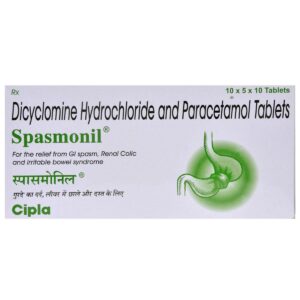PARACETAMOL (ACETAMENOPHEN) + DICYCLOMINE
Paracetamol (acetamenophen): Drug name: Paracetamol(acetaminophen)
Use: Paracetamol, also known as acetaminophen, is a medication used to treat mild to moderate pain and reduce fever. It is commonly used for conditions such as headaches, muscle aches, toothaches, colds, and fevers.
Mechanism of action: The exact mechanism of action of paracetamol is not fully understood. It is believed to work by inhibiting the synthesis of prostaglandins, which are substances in the body that are responsible for pain and fever. Paracetamol also acts on the central nervous system to reduce pain perception.
Dose: The recommended dose of paracetamol for adults is usually 500 to 1000 mg every 4 to 6 hours, with a maximum daily dose of 4 grams (4000 mg). It is important to follow the recommended dosage and not exceed the maximum daily dose to avoid the risk of liver damage.
Side effects: Paracetamol is generally considered safe when taken at recommended doses. However, like any medication, it can cause side effects. Common side effects include nausea, stomach pain, and rash. Taking higher doses of paracetamol or using it for a prolonged period of time can increase the risk of liver damage, so it is important to adhere to the recommended dosage. Allergic reactions to paracetamol are rare but can occur. It is important to seek medical attention if any unusual symptoms or severe side effects occur.
Caution: Paracetamol should be used with caution in patients with liver or kidney disease, as it can further strain these organs. It is important to avoid alcohol while taking paracetamol, as it can increase the risk of liver damage. Paracetamol should not be used in combination with other medications containing paracetamol, as this can lead to an overdose. It is always advisable to consult a healthcare professional or read the package insert for specific dosing instructions and any potential drug interactions.
Dicyclomine: Dicyclomine is a medication primarily used to treat symptoms of irritable bowel syndrome (IBS), including abdominal pain and cramping. It belongs to a class of drugs called anticholinergics, which work by relaxing the smooth muscles in the wall of the gastrointestinal tract.
The exact mechanism of action of dicyclomine is not fully understood, but it is thought to possess antispasmodic properties by blocking the action of acetylcholine, a neurotransmitter that plays a role in muscle contraction in the digestive system. By inhibiting the effects of acetylcholine, dicyclomine helps relieve abdominal pain and reduce spasms in the gastrointestinal tract.
Dicyclomine is typically taken orally as a tablet or liquid, and the recommended dose varies depending on the individual and the condition being treated. For IBS, the usual dose is 20 mg, taken four times a day before meals and at bedtime. It is important to follow the instructions provided by your doctor or pharmacist.
Like any medication, dicyclomine can cause side effects. Common side effects may include dry mouth, constipation, blurred vision, dizziness, drowsiness, and difficulty urinating. These side effects are usually mild and temporary. However, if they persist or worsen, it is important to consult a healthcare professional.
In some cases, dicyclomine can cause more serious side effects, such as a rapid or irregular heartbeat, severe abdominal pain or bloating, difficulty breathing, or signs of an allergic reaction (e.g., rash, itching, swelling). If any of these symptoms occur, it is crucial to seek immediate medical attention.
It is important to note that dicyclomine may interact with other medications, so it is essential to inform your doctor about all the medications, supplements, and herbal products you are taking. Additionally, dicyclomine should not be used in certain conditions, such as glaucoma or myasthenia gravis, without medical supervision.
Overall, dicyclomine is an effective medication for relieving symptoms of irritable bowel syndrome, but it is essential to use it as directed and be aware of potential side effects. Always consult with a healthcare professional for personalized advice and guidance.

